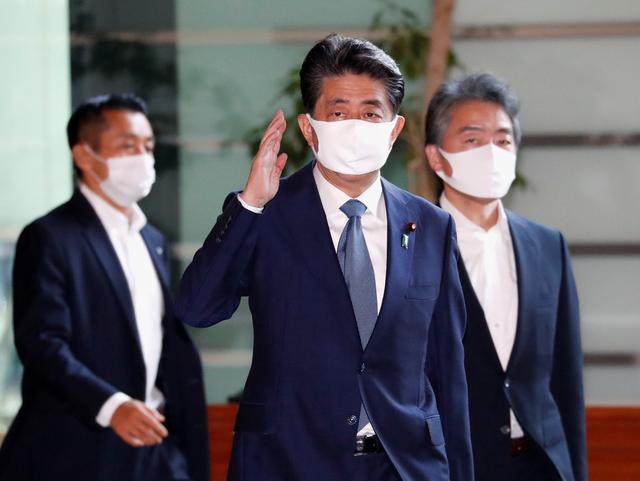News
Japan’s Prime Minister Resigns Over His Poor Health

AFP- Japan’s Prime Minister Shinzo Abe announced Friday he will resign, ending his record-breaking tenure in a bombshell development that kicks off a leadership race in the world’s third-largest economy.
Abe said he is suffering a recurrence of the ulcerative colitis that forced him to cut short a first term in office, and that he no longer felt able to continue as prime minister.
“Now that I am not able to fulfil the mandate from the people with confidence, I have decided that I should no longer occupy the position of the prime minister,” he said.
Even as recently as Friday morning, the government spokesman had appeared to dismiss concerns about Abe’s health and suggested he would stay on.
But Abe made clear that would not be possible, apologising for once again cutting short his tenure.
– ‘A big surprise’ –
Abe said he would “firmly execute my duty to the end”, and until the next prime minister is appointed, possibly through a leadership election involving ruling party lawmakers and members.
The resignation shocked the markets, with Tokyo stocks plunging more than two percent towards the end of afternoon trade when reports of Abe’s decision first emerged.
“It was a big surprise”, said Shinichi Nishikawa, a professor of political science at Meiji University in Tokyo.
“His resignation comes at a time when Japan is facing tough issues, including measures against the coronavirus,” Nishikawa told AFP.”
Abe had been expected to stay in office until the end of his term as LDP leader in September 2021, and the jockeying for position to succeed him was still in its early stages.
Still, some potential successors have already emerged, among them Finance Minister Taro Aso, chief cabinet secretary Yoshihide Suga, former defence minister Shigeru Ishiba and LDP policy chief Fumio Kishida.
Kishida is rumoured to be Abe’s personal choice, while Aso commands one of the strongest blocs within the ruling party.
Most of the potential successors are seen as unlikely to break significantly with Abe’s policies.
– Bitterly familiar decision –
Abe declined to be drawn on who he would like to see take the top job, saying he had “no intention” of influencing the election, and that those often floated as candidates were all “highly capable”.
Experts said the election process was likely to happen in the coming weeks, with a new parliamentary session possible by October.
Abe’s decision to step down will be bitterly familiar for the man who was forced to leave office just one year after becoming the country’s youngest-ever prime minister.
He has since become Japan’s longest-serving premier, forever associated with the economic policy that bears his name: Abenomics.
He said his legacy would be for others to decide but pointed to his efforts to bring Barack Obama to Hiroshima, making him the first sitting US president to visit the site of the atomic bomb attack, as among his proudest achievements.
Among his greatest disappointments, he said, was his inability to bring home Japanese people kidnapped by North Korea decades ago.
Tributes poured in from leaders around the world, with Indian Prime Minister Narendra Modi praising Abe’s “wise leadership” for strengthening ties and wishing him a speedy recovery, while the Kremlin hailed Abe’s “invaluable contribution” to relations.
Britain’s Prime Minister Boris Johnson tweeted he had “achieved great things”.
A spokesman for the presidential Blue House in Seoul praised Abe for his “many meaningful achievements”.
China was more circumspect, with a foreign ministry spokesman saying the resignation was an “internal affair” on which it would not comment.
Abe’s time in office will end with his government facing slumping approval ratings over its handling of the coronavirus crisis, including a U-turn on stimulus and a widely-mocked policy to issue cloth face masks to every household.
Some in Tokyo were quick to criticise Abe after his resignation was announced.
“He has been in the prime minister’s office way too long. I don’t want to see his face honestly. Seven years and eight months, too long!” said Tetsuya Daimon, 54.
Abe’s departure also means he will not be in charge as the country prepares to host the coronavirus-delayed Tokyo Olympics next year.
Kenya Insights allows guest blogging, if you want to be published on Kenya’s most authoritative and accurate blog, have an expose, news TIPS, story angles, human interest stories, drop us an email on [email protected] or via Telegram
-

 Grapevine2 days ago
Grapevine2 days agoAlleged Male Lover Claims His Life Is in Danger, Leaks Screenshots and Private Videos Linking SportPesa CEO Ronald Karauri
-

 Lifestyle5 days ago
Lifestyle5 days agoThe General’s Fall: From Barracks To Bankruptcy As Illness Ravages Karangi’s Memory And Empire
-

 Americas2 weeks ago
Americas2 weeks agoEpstein Files: Bill Clinton and George Bush Accused Of Raping A Boy In A Yacht Of ‘Ritualistic Sacrifice’
-

 Business2 weeks ago
Business2 weeks agoCooking Fuel Firm Koko Collapses After Govt Blocks Sh23bn Carbon Deal
-

 Business2 weeks ago
Business2 weeks agoABSA BANK IN CRISIS: How Internal Rot and Client Betrayals Have Exposed Kenya’s Banking Giant
-

 Investigations7 days ago
Investigations7 days agoEpstein Files: Sultan bin Sulayem Bragged on His Closeness to President Uhuru Then His Firm DP World Controversially Won Port Construction in Kenya, Tanzania
-

 News1 week ago
News1 week agoAUDIT EXPOSES INEQUALITY IN STAREHE SCHOOLS: PARENTS BLED DRY AS FEES HIT Sh300,000 AGAINST Sh67,244 CAP
-

 Business1 week ago
Business1 week agoKRA Can Now Tax Unexplained Bank Deposits












